
The credits, more properly called Renewable Identification Numbers, or RINs, verify that fuel blenders (typically refiners) have purchased either enough ethanol or enough RINs to meet a federal mandate that has run up against a limit based on consumption. The mandate is based on an estimate of fuel consumption from 2007 which would require 13.8 billion gallons of ethanol to be produced this year.
The problem is that there is not sufficient demand for motor fuel to induce ethanol producers to make enough to meet their mandated output. Demand is expected at around 10.6 billion gallons this year, and that’s how much ethanol makers are likely to produce. Thus, blenders have to have the credits to ensure that they won’t be penalized for not blending 13.8 billion gallons at the end of the year.
Valero Energy Corp. (NYSE: VLO), the country’s largest refiner, estimates that RINs will cost it nearly $750 million this year, and consumers will ultimately pay those costs at the pump.
Although both CME Group Inc. (NASDAQ: CME) and The IntercontinentalExchange Inc. (NYSE: ICE) now offer futures trading in RINs, the market for RINs is small and illiquid.
RINs, are one a host of other factors that contribute to the high cost of gasoline at the pump. And, barring Congressional action, the situation will only get worse next year.
Are You Ahead, or Behind on Retirement? (sponsor)
If you’re one of the over 4 Million Americans set to retire this year, you may want to pay attention. Many people have worked their whole lives preparing to retire without ever knowing the answer to the most important question: are you ahead, or behind on your retirement goals?
Don’t make the same mistake. It’s an easy question to answer. A quick conversation with a financial advisor can help you unpack your savings, spending, and goals for your money. With SmartAsset’s free tool, you can connect with vetted financial advisors in minutes.
Why wait? Click here to get started today!
Thank you for reading! Have some feedback for us?
Contact the 24/7 Wall St. editorial team.




